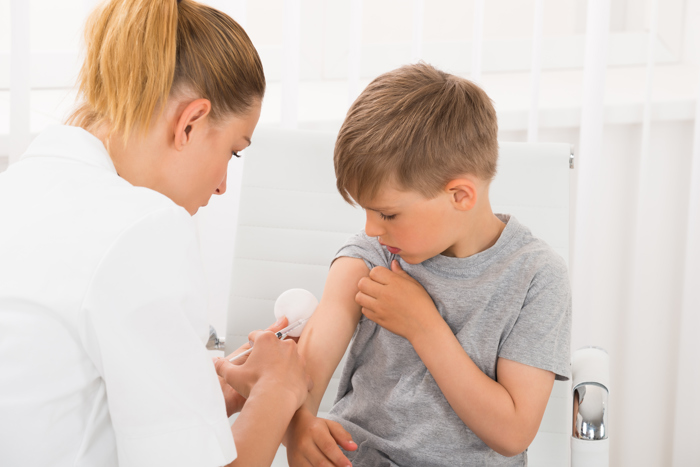From birth, we are constantly exposed to many different viruses, bacteria and other microbes. Most are not harmful, many are beneficial but some can cause disease.
The body's immune system helps protect us against infections. When we are exposed to infection, the immune system triggers a series of responses to neutralise the microbes and limit their harmful effects. Exposure to an infectious disease often gives lifelong protection (immunity) so we do not contract the same disease again. Our immune system “remembers” the microbe.
Simple and effective protection
We often develop lifelong immunity when we have had a disease. However, some diseases may lead to serious complications and sometimes death. The aim of vaccination is to obtain this immunity without any of the risks of having the disease.
When we vaccinate, we activate the immune system's "memory." During vaccination, a weakened microbe, a fragment, or something that resembles it, is added to the body. The immune system is then activated without us becoming sick. Some dangerous infectious diseases can be prevented in a simple and effective way.
For some diseases, vaccination provides lifelong protection, while for others the effect is diminished after a few years. The Norwegian Institute of Public Health therefore recommends that adults take booster doses of certain vaccines, to maintain immunisation against disease.
Infants tolerate vaccines well
In the womb, our immune system is already prepared to tackle various microbes that we encounter after birth. Since vaccines only use a small part of a child's immune capacity, the immune system is burdened much less than with common infections, such as a cold. Infants therefore tolerate vaccination well, including receiving several vaccinations at the same time.
Vaccination and herd immunity
When the majority of the population has been immunised against a disease, there will be few people left who can be infected. This will in turn help protect children who are too young to have received the vaccine as well as people who cannot be vaccinated due to certain pre-existing conditions. This is known as herd immunity.
Vaccinations make it possible to eradicate certain diseases globally. So far, this has been achieved for the viral disease smallpox.
Childhood Immunisation Programme
In Norway, all vaccination is voluntary.
The recommended vaccination programme for children and adolescents includes vaccines against 12 different diseases:
- Vaccine against rotavirus.
- Vaccine against diphtheria, tetanus, whooping cough, poliomyelitis, infection with Haemophilus influenzae type b (Hib) and hepatitis B.
- Vaccine against pneumococcal disease.
- Vaccine against measles, mumps, rubella (MMR).
- Vaccine against human papilloma virus (HPV) - which can cause cervical cancer and other cancers cause by HPV.
- Some children are also offered vaccine against tuberculosis (BCG).
All these diseases can be life-threatening or result in serious complications.
Vaccination usually begins when a child is six weeks old. Since several of the diseases vaccinated against affect the youngest children the hardest, delays should be avoided. Booster doses are given when a child reaches school age.
From May 2024, all pregnant women will be offered the whooping cough vaccine. Vaccination during pregnancy protects the baby against whooping cough from birth until their first vaccine dose is given at 3 months old.
When will your child be offered vaccines?
Here is an overview of when your child will be offered vaccines as part of the Childhood Immunisation Programme.
How are vaccines given?
The rotavirus vaccine is given orally (drinkable vaccine). The other vaccines are administered by injection. Mercury is not used as a preservative in any of the vaccines in the Childhood Immunisation Programme.
Combination vaccines
Combination vaccines have been used since the Norwegian Childhood Immunisation Programme began in 1952. These contain vaccines against several diseases in the same syringe, which means fewer injections for the child. The combination vaccines result in fewer side effects than when the vaccines are given individually.
Before and after vaccination (In norwegian)
Most children have little or no reaction after vaccination. Remember to inform the nurse if the child has allergies or other health problems.
What happens in the body when you vaccinate?
During vaccination, the body is exposed to either a weakened microbe (bacteria or virus), fragments of a microbe, or something that resembles the microbe. When the active substances in the vaccine meet the body's immune system, immune cells and antibodies are produced that will recognise the "real" microbe. When the vaccinated person encounters this microbe, the immune system will provide a faster and better immune response that can prevent disease. This is artificially acquired active immunity.
A good vaccine will provide adequate and prolonged protection against the disease. The number of doses needed varies from vaccine to vaccine. For some vaccines, there is a need for a booster dose later in life to maintain protection. These include vaccines against tetanus, diphtheria, polio and pertussis. Booster doses may also be required for travel vaccines.
What is immunity?
When the body is infected with a microbe (virus, bacterium, parasite or fungus), it stimulates the production of important immune cells. After recovery from a disease, some of the immune cells will "remember" these microbes. This is called immunological memory. Next time the body is exposed to the same type of microbe, the immune system will recognise it. The body's defence against the disease becomes faster and more powerful and can prevent the person from becoming ill. This is naturally acquired active immunity.
